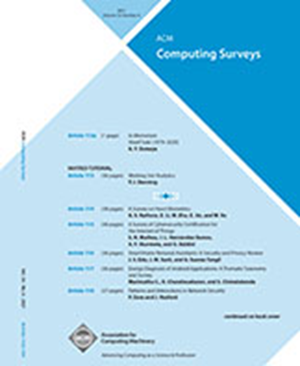电动汽车和飞行器的网络安全:威胁、挑战、人工智能解决方案和未来方向
IF 23.8
1区 计算机科学
Q1 COMPUTER SCIENCE, THEORY & METHODS
引用次数: 0
摘要
电动汽车和飞行汽车(EnFVs)代表了交通运输领域的变革,有望提高效率并减少对环境的影响。然而,它们与互联数字生态系统的整合带来了巨大的网络安全挑战,包括网络物理威胁、隐私漏洞和供应链风险。本文全面探讨了这些挑战,并研究了人工智能(AI)驱动的解决方案,以加强 EnFV 网络安全。研究首先概述了 EnFV 网络安全问题,强调了数字运输系统中日益复杂的威胁。在方法论上,本文回顾了现有文献以找出差距,并评估了人工智能在网络安全应用方面的最新进展。主要方法包括人工智能驱动的入侵检测、利用机器学习算法进行威胁分析、预测性维护策略以及增强型身份验证协议。研究结果强调了人工智能技术在降低 EnFV 网络安全风险方面的有效性,并展示了经过改进的威胁检测和响应能力。研究最后概述了未来的研究方向,强调了在人工智能、量子计算弹性、区块链应用和伦理考虑方面持续创新的必要性。这些发现有助于更清晰地了解 EnFV 网络安全动态,并为提高未来运输系统的安全性和可靠性提供了路线图。本文章由计算机程序翻译,如有差异,请以英文原文为准。
Cybersecurity in Electric and Flying Vehicles: Threats, Challenges, AI Solutions & Future Directions
Electric and Flying Vehicles (EnFVs) represent a transformative shift in transportation, promising enhanced efficiency and reduced environmental impact. However, their integration into interconnected digital ecosystems poses significant cybersecurity challenges, including cyber-physical threats, privacy vulnerabilities, and supply chain risks. This paper comprehensively explores these challenges and investigates artificial intelligence (AI)-driven solutions to bolster EnFV cybersecurity. The study begins with an overview of EnFV cybersecurity issues, emphasizing the increasing complexity of threats in digital transportation systems. Methodologically, the paper reviews existing literature to identify gaps and assesses recent advancements in AI for cybersecurity applications. Key methodologies include AI-powered intrusion detection, threat analysis leveraging machine learning algorithms, predictive maintenance strategies, and enhanced authentication protocols. Results underscore the effectiveness of AI technologies in mitigating EnFV cybersecurity risks, demonstrating improved threat detection and response capabilities. The study concludes by outlining future research directions, highlighting the need for continued innovation in AI, quantum computing resilience, blockchain applications, and ethical considerations. These findings contribute to a clearer understanding of EnFV cybersecurity dynamics and provide a roadmap for enhancing the security and reliability of future transportation systems.
求助全文
通过发布文献求助,成功后即可免费获取论文全文。
去求助
来源期刊

ACM Computing Surveys
工程技术-计算机:理论方法
CiteScore
33.20
自引率
0.60%
发文量
372
审稿时长
12 months
期刊介绍:
ACM Computing Surveys is an academic journal that focuses on publishing surveys and tutorials on various areas of computing research and practice. The journal aims to provide comprehensive and easily understandable articles that guide readers through the literature and help them understand topics outside their specialties. In terms of impact, CSUR has a high reputation with a 2022 Impact Factor of 16.6. It is ranked 3rd out of 111 journals in the field of Computer Science Theory & Methods.
ACM Computing Surveys is indexed and abstracted in various services, including AI2 Semantic Scholar, Baidu, Clarivate/ISI: JCR, CNKI, DeepDyve, DTU, EBSCO: EDS/HOST, and IET Inspec, among others.
 求助内容:
求助内容: 应助结果提醒方式:
应助结果提醒方式:


